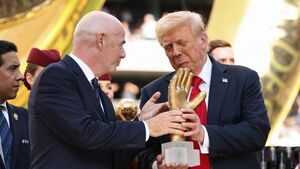FIFA's Peace Prize marks a new nadir

US President Donald Trump looks at the golden glove trophy next to FIFA president Gianni Infantino after the FIFA Club World Cup final played earlier this year at the MetLife Stadium in New Jersey. Picture: Getty Images
Gianni Infantino is standing at the John F Kennedy Center, grinning like a man unveiling the cure for irony. Behind him, the stage gleams with Fifa logos and faux gravitas. And in the front row – hair aglow and tie the bright colour of a fast food chain – sits Donald Trump, waiting to be named the first recipient of the Fifa Peace Prize.
Even history is wincing.
The cameras flash. Infantino speaks of “unity,” “understanding,” and “a new era of dialogue”. The phrases bounce around the room like lost footballs. Then comes the headline moment: the US President, football’s new apparent peacemaker, rises to applause that sounds more nervous than sincere.
It would sound silly if it all didn’t feel somewhat prophetic.
For this isn’t satire; it’s already on the calendar. Next month, Fifa will announce its first-ever Peace Prize on the day of the World Cup draw, with Trump widely expected to collect the accolade. A Nobel Prize knock-off, presented by an organisation that can’t decide whether it’s a sports body or a Bond villain.
For decades, Fifa lingered in politics’ shadow – a little grubby, a little useful, but never quite respectable. Now it’s decided to step into the light itself. If ever there was a moment that captured the moral freefall of modern football, this is it: the game’s global figurehead attempting to play geopolitics.
Fifa has always been comfortable near power. But this feels like something else entirely – a descent, not into politics, but into parody.
Fifa has always been political. It can protest otherwise until the microphones melt, but the evidence is stitched into its very logo. Mussolini knew it in 1934, when the World Cup became a fascist costume party with a trophy at the end. Argentina knew it in 1978, when the junta filled the terraces with songs of unity while the screams from the torture chambers nearby drifted through the streets of Buenos Aires.
Russia knew it in 2018 – gleaming stadiums, smiling strongmen and a tournament scrubbed clean of dissent. And Qatar knew it best of all, building its “festival of inclusion” on the backs of the excluded.
For most of that history, it was the governments who came calling. Fifa was the visitor to the palace, the soft-power concierge to regimes seeking a little borrowed legitimacy. A photograph with the president here. A handshake with the general there.
But somewhere along the line, something changed. The power stopped flowing to Fifa and began flowing from it. Now, it is Infantino who comes bearing gifts and slogans, trailing ministers and monarchs like a travelling preacher flogging salvation from the back of his Bentley.
In the old days, despots courted Fifa. Now FIFA courts them.
What used to be a sideshow has become the main event. Football’s governing body is no longer content to orbit politics, but desperate to sit at its table, to be seen, to matter. The descent isn’t into corruption – that’s old news. The descent is into self-importance, the belief that the world’s most cynical institution can somehow sell itself as its own saviour.
In recent times Infantino has begun speaking of tournaments in the same breath as ceasefires. This is, apparently, Fifa’s new diplomacy: photo opportunities in presidential palaces, handshakes in Riyadh, declarations of brotherhood between billionaires. Infantino’s dream is not just to govern football but to play statesman – to make Fifa the Vatican of sport, dispensing blessings to whoever builds the next stadium.
The irony, of course, is that football already had a language of peace – it lived in the streets and the parks and the little moments that never needed to be translated. Infantino has taken that simplicity and inflated it into a philosophy, wrapping it in slogans until the meaning is gone.
The Fifa Peace Prize isn’t moral leadership. It’s moral stagecraft.
Next year’s World Cup will be the largest ever staged – 48 teams, 16 cities, three countries. Fifa has called it the most inclusive tournament in history. But inclusion isn’t the point. Infantino has built an empire of quantity, not quality – more matches, more sponsors, more versions of the same slogan translated into more languages. North America will host the spectacle but not the spirit.
In 1994, the tournament arrived as a curiosity and left as a revelation. It was the moment the world discovered America could fall in love with football. Over three decades later, the sequel feels contractual. The country will stage it, broadcast it, sell it, and then move on. In a nation already drowning in sports entertainment, the world’s greatest show will barely ripple the surface.
That, more than anything, captures how far the tournament has drifted from its soul. The World Cup has become another channel in the global feed, stripped of mystery and inflated by marketing. The old electricity has gone, replaced by the flicker of digital signage. The joy that once united a planet has been itemised into content.
It will be the biggest World Cup ever held, and perhaps the smallest in spirit.
That is the price of Infantino’s grand delusion, the cost of a sporting body that wants to be a geopolitical player. The bigger his vision grows, the smaller the game feels. In chasing the approval of presidents and princes, Fifa has surrendered the only thing it ever truly owned – the world’s affection.
It has traded the roar of belonging for the applause of the powerful. The World Cup, once a celebration of humanity’s brief togetherness, has become a networking event with national anthems. And Infantino, in his tailored diplomacy, seems not to notice that each new handshake leaves another fan behind.
Football was supposed to be the world’s great distraction, the game that made sense when nothing else did. Now even that illusion is gone. In trying to sit at the top table of politics, Fifa has forgotten where its table was – among the people who loved it without needing to be sold a vision.
Once, politicians used Fifa to look noble.
Now Fifa uses politicians to look relevant.




